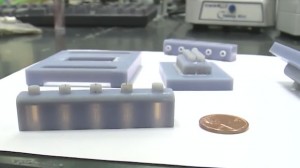NEW YORK (Reuters Health) – Infants requiring hospitalization for acute bronchiolitis do not recover any more quickly when chest physiotherapy is performed, as is routine practice in some countries, a French team reports.
“Chest physiotherapy is widely used in France, Belgium and Switzerland, occasionally in Italy, Germany, Spain, Portugal, Brazil and Canada,” Dr. Vincent Gajdos told Reuters Health, “and very rarely in USA.”
Dr. Gajdos, at Hopital Antoine Beclere – APHP in Clamart, France and colleagues explain in PLoS Medicine for September 28 that while international recommendations do not indicate chest physiotherapy for bronchiolitis, French national guidelines recommend increased exhalation technique (IET) and assisted cough (AC) for treatment of acute bronchiolitis in infants. However, the efficacy of this approach had not been evaluated.
To remedy this, the team conducted a randomized trial in 496 infants hospitalized with a first episode of acute bronchiolitis. They were assigned to receive IET + AC physiotherapy three times daily or only nasal suction (control group).
The time to recovery, measured by minimal chest recession, improved food intake and discontinuation of supplemental oxygen, was 2.31 days in the controls and 2.02 days in the physiotherapy group (p=0.33), the investigators report.
“The conclusions of our paper are that there is no efficacy in terms of “time for recovery” in infants hospitalized. However, our results could not be applied in outpatients, and further studies are needed to evaluate the efficacy of chest physiotherapy in terms of feeding tolerance, global comfort, quality of sleeping and maybe, need of hospitalization,” Dr. Gajdos commented.
Are there any adverse effects associated with the practice? “In France we have experienced this technique for many years and have never seen any major side-effect except for vomiting and transient respiratory destabilization during the procedure,” Dr. Gajdos responded. “However, it is worth noting that these side effects of IET + AC were transient and resolved as soon as the procedure was interrupted.”
He added, “Some papers related rib-fractures with this treatment; we didn’t observe such side-effect in our study. Our opinion is that this is a very rare event that is linked to misconduct of the technique by physiotherapists who are not properly trained.”
That said, the authors conclude, “Our results did not support the recommendation that chest physiotherapy be routinely performed in hospitalized infants with acute bronchiolitis.”
Reference:
Effectiveness of Chest Physiotherapy in Infants Hospitalized with Acute Bronchiolitis: A Multicenter, Randomized, Controlled Trial
PLoS Medicine 2010;7:e1000345.




